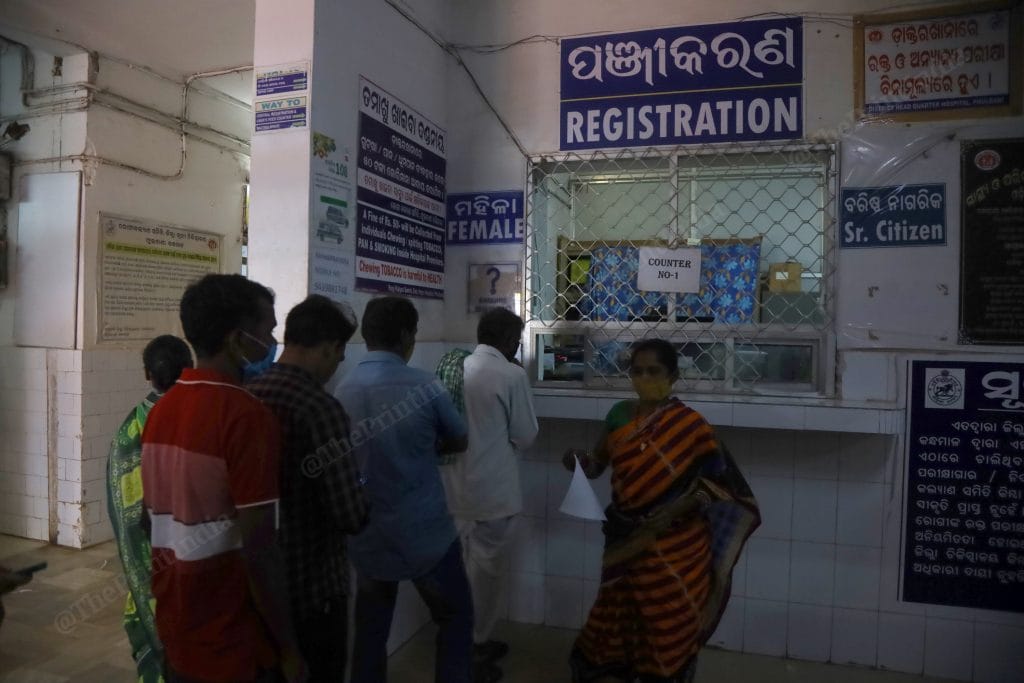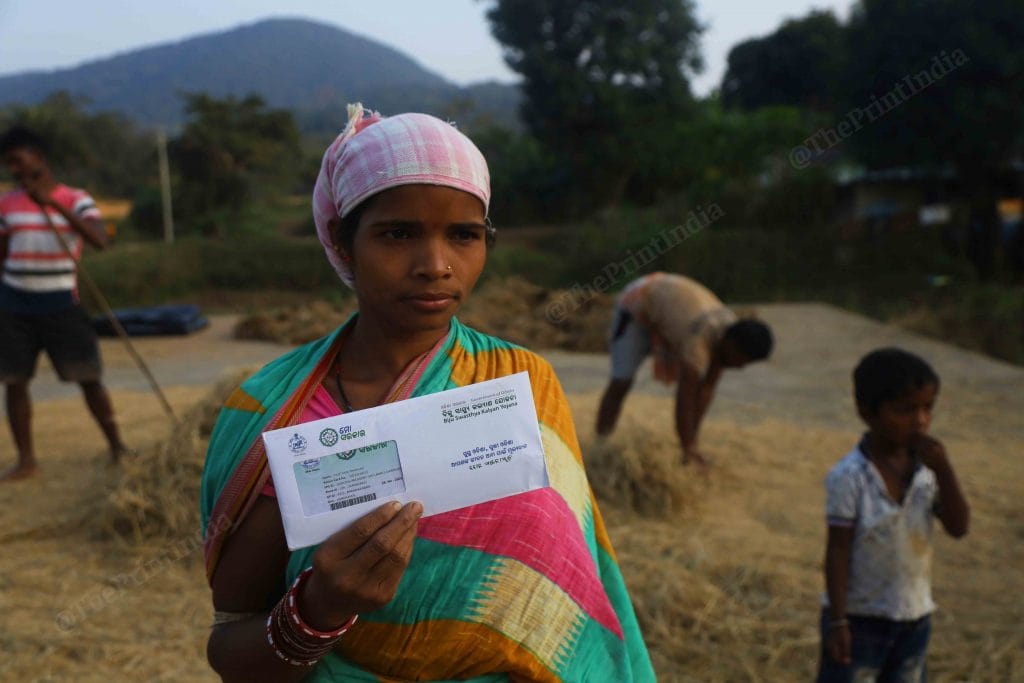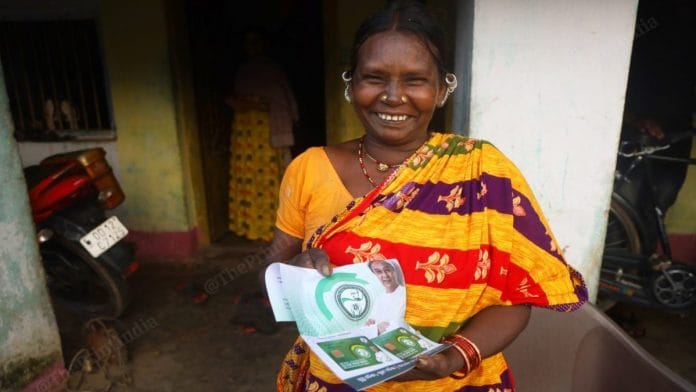Sundargarh: At the district headquarters hospital in Kandhamal, Odisha, 19-year-old Magdalini Digambar clutches her medical test reports and prescriptions and rushes to a helpdesk that has a sign above it saying “Biju Swasthya Kalyan”.
She is accompanied by her hostel roommate Astory Mallick, 22, who has a bag of medicines in hand. Both have been experiencing extreme body pains and are desperate for relief. The official at the helpdesk processes their documents and the women seem reassured.
Magdalini and Astory are students of the government polytechnic college in Phulbani, Kandhamal district, and have chosen to stay at a hostel to avoid the long commute from their hometown G. Udayagiri. They said they were worried about their sudden aches, especially since they were away from home, but were relieved when they found they could access medical help easily.
“Our parents were worried initially too, but now they are okay since they got to know how easy it was for us to meet the doctor, get our tests, and get the required medicines. The doctor was very kind and told us how to go about our treatment,” Magdalini told ThePrint. Not just that, their doctor consultations and medicines were completely free of cost under the Biju Swasthya Kalyan Yojana (BSKY), the Naveen Patnaik government’s flagship health scheme.
However, BSKY, named after the chief minister’s late father Biju Patnaik, also a two-term chief minister, has generated its fair share of controversy.
Odisha is one of only four states/UTs (the others are Delhi, Telangana, and West Bengal) that have not accepted the Ayushman Bharat Pradhan Mantri Jan Arogya Yojana (AB-PMJAY), the Modi government’s health coverage scheme for the poor.
Ever since Ayushman Bharat was launched in September 2018, Odisha has refused to implement it, claiming that its own scheme, introduced just about a month earlier, is superior. Over the last few years, Odisha Chief Minister Naveen Patnaik has refused to budge despite criticism from Prime Minister Narendra Modi, former health minister (and now BJP president) J.P. Nadda, and Union education minister Dharmendra Pradhan.
Explaining why the state has not implemented the central government scheme, B.K. Mohapatra, the Director of Health Services in Odisha, said the BSKY was better suited for people in the state as its reach was better than Ayushman Bharat, and more services were available.
ThePrint visited several cities and districts of Odisha — including Puri, Bhubaneswar, Kandhamal, Kalahandi, Balangir, and Sundargarh — and found that although BSKY has reached many beneficiaries, there are also sections of eligible people that are not yet aware of the scheme.
The state government is currently trying to close these gaps by distributing health smart cards to even the most remote villages.
Also Read: New corridor, more breathing space — how Puri Jagannath temple is revamping for the times
The case for BSKY’s ‘superiority’ in Odisha
According to a 2021 India Today opinion poll, Naveen Patnaik is the country’s most popular chief minister in his own state. The Biju Janata Dal (BJD) leader keeps a low profile outside Odisha, but in the state his presence looms large.
There are posters of Patnaik even in the remotest villages, and casual conversations with people on the street indicate that he is favourably viewed in general. Many people say they support the government’s policies, among which the health scheme also finds high favour.

Director of Heath Services B.K. Mohapatra said the Biju health scheme has been a success because it has been tailored to cater to the needs of the people of Odisha.
“BSKY covers nearly 92 per cent of the population as opposed to the 60 per cent reach that Ayushman Bharat has. Under Ayushman Bharat, one can only avail inpatient services, whereas BSKY provides for both inpatient and outpatient services,” he told ThePrint.
“The package for Ayushman Bharat is capped at Rs 5 lakh a year, but in Odisha under BSKY, families can even avail of packages double that — Rs 10 lakh, for female members of the household,” Mohapatra added.
“Our aim is to give free health service to our population and protect economically vulnerable families from falling into the poverty trap due to catastrophic health expenditures,” he said.
What the scheme covers
All government healthcare facilities in Odisha offer free treatment under BSKY regardless of the patient’s income or residence status.
In addition, private hospitals have been empanelled under the scheme for families that have a Below Poverty Line (BPL) card, Antyodaya Anna Yojana (AAY) card, or if their annual income is less than Rs 50,000 and Rs 60,000 in rural and urban areas, respectively.
An annual health coverage of Rs 5 lakh is provided per family. On top of this, families with women members get an additional Rs 5 lakh, taking the total coverage to Rs 10 lakh.
The Biju health scheme covers well over 15,000 medical conditions/injuries, ranging from burns and minor accidents to tuberculosis and malaria. Long-term treatments like dialysis and chemotherapy also come under the purview of the scheme.
While patients often need to get a referral from a government hospital to get treatment at a private facility, there are exceptions for emergencies and serious conditions like a heart attack, severe physical injuries, and cancer.
Covid diagnosis and treatment — whether it is a test or 30 days in the ICU — is entirely free of charge in government hospitals. The state government has also empanelled 88 private hospitals across the state to provide free Covid treatment.
To streamline services and treatment under the scheme, the government has also set up separate BSKY helpdesks in all government healthcare facilities, from district hospitals to community clinics, to guide people on how to avail of these services.
Bhagyalaxmi Barik, who runs the BSKY help desk at the Phulbani district hospital, told ThePrint that close to 200-300 people utilise services under the scheme every day.
However, not all help desks appear to function at the same level of efficiency.
At the community health centre in Baliguda, Kandhamal district, there was no one at a desk that carried the BSKY logo, and staff members and patients ThePrint approached said they were unaware what the scheme is. A doctor said he knew about the scheme but didn’t answer any other queries.
The BSKY help desk at the primary health centre in Pipli, Puri district, had no official either, although the staff and patients said they knew what the scheme was, having received their enrolment cards a week ago.
The Odisha government now also plans on empanelling around 200 private hospitals outside the state to provide BSKY services to Odiyas residing in other parts of the country. “This is so even the vast population of migrant workers can benefit from the scheme,” Mohapatra said.
Also Read: Rich outlive poor by 7.5 years, upper caste women live 15 years more than Dalits: Oxfam report
Is the scheme actually reaching people?
More than 69 lakh families in the state have been enrolled for services under BSKY since the scheme’s launch on 15 August 2018. The target now is to cover 96.5 lakh families.
However, three years after the BSKY was implemented, awareness about it is still not as extensive as might be expected, especially in villages.

One such person was Swarindi Sahu, who gave birth last week at the district hospital in Phulbani. She paid for the delivery from her own pocket, she told ThePrint. Similarly, Kunjbati Mallick in Daringbadi said she developed a fever recently and paid to see a doctor and get medicines. All of this could have been covered under the BSKY.
To counter this problem, the state government in October launched the Biju Swasthya Kalyan smart card, with the aim of creating awareness about the scheme and also keeping records.
Additional Health Secretary Subhananda Mohapatra told ThePrint that 96.5 lakh families enrolled under the National Food Security Act/State Food Security Scheme would be given two smart cards that each member could use to get health services.
Explaining how the cards work, he said the details of each member are stored in the card and the BSKY transaction management system. When a card is used for the first time, the user gets “validated”. They can then avail of cashless treatment whenever needed using the card.
Kalahandi District Magistrate Parag Harshad Gavali told ThePrint that the Biju health card is aimed to “empower” people. “It is like an ATM card for them and makes it easier also for hospitals and the state to keep records,” he said.
The distribution of cards is in full swing across districts, with panchayats handing them to people in many remote villages. The Chief District Medical Officer of Sundargarh, Saroj Kumar Mishra, told ThePrint that over 4.3 lakh smart cards had been distributed in the district, while in Kandhamal, District Magistrate Brundha D. said over 1.7 lakh cards had been distributed
Nirtama Pradhan, a 26-year-old farmer in Kalahandi district who just received the smart card a week ago, was pleased. “Our family has the card and we know it will be beneficial when someone falls ill,” he told ThePrint. “Then the government will provide free treatment.”
(Edited by Asavari Singh)
Also Read: Matilda Kullu — Odisha ASHA worker on Forbes list who battled Covid, superstition & casteism






